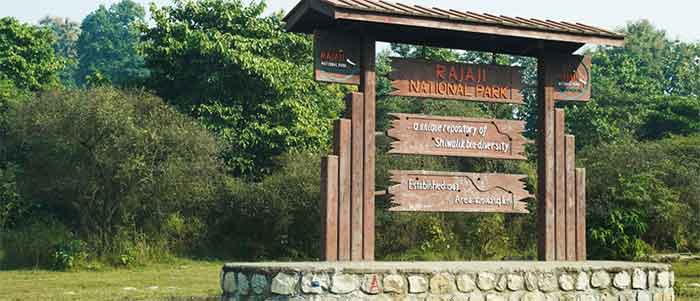
Close to Saharanpur in Western UP and Haridwar and Dehradun in the hill state of Uttarakhand, sprawls the dense forests of the Rajaji National Park. With elephant corridors stretching across the zigzag of the green density into the Jim Corbett National Park and a precious tiger and wildlife sanctuary near the upper regions of the Kumaon hills, the Rajaji National Park, though young in its formation, has acquired a coveted tag as one of the finest preserved and conserved forests in India.
The park’s tiger population has increased in huge numbers in the recent past, along with other wildlife and flora and fauna, including king cobras and wild elephants, even as a beautiful river called the Ganga disappears near the pristine landscape of Chilla, becoming suddenly underground, only to reappear shining bright in the sunlight as it meanders towards the plains.
Over the decades, the invisible and hardy community which has sustained these pristine forests and water bodies, along with the wild life, with no history ever of animal-man conflict, are the sturdy and stoic community of the Van Gujjars. They have lived in peace-coexistence in the core area of the forests since long, their huge, thatched homes like fortresses, even as they continue to trade in milk and milk products, rearing their cattle like divine creatures.
In recent times, as it has happened in most forests across India, especially in the tiger reserves, they have been forced to shift to buffer zones, where they have continued to live according to law, peacefully and in harmonious existence with nature. Their children go to school and colleges now, and they trade their milk products every day in the towns nearby. They are known to be peaceful and friendly, and even in this hot and scorching summer, when the little water bodies dry up, they continue to work and survive against all odds.
Typically, as it has happened since the colonial times, and continued after in independent India, the notorious Forest Department has treated them with scant respect, and have almost always chosen to exploit and terrorize them. In recent times though, all this has changed radically with the Van Gujjars organizing themselves under the banner of the All Indian Union of Forest Working People (AIUFWP), which has its network in the Adivasi and rural belt across the forests in India with thousands as members.
The pandemic and lockdown marked its toll on the Van Gujjars as well, like most other poor people and unorganized workers. In their specific case the overall misery has been compounded by the callous actions of the authorities.
 A bit of history first. The Park was declared a wildlife sanctuary in 1983 and[1] the first attempt to relocate the Van Gujjars from the park was undertaken in 1985. In the following years, the community members were regularly harassed to vacate the land and move out of the park.
A bit of history first. The Park was declared a wildlife sanctuary in 1983 and[1] the first attempt to relocate the Van Gujjars from the park was undertaken in 1985. In the following years, the community members were regularly harassed to vacate the land and move out of the park.
Then came the Forest Fights Act (FRA) under the UPA II government in 2006. Promulgated in December 2006, with the National Advisory Committee led by Sonia Gandhi and social activists like Aruna Roy, Jean Dreze and Harsh Mander, among others, as members, this was a path-breaking enactment in the post-Independence era for India’s forest dwellers.
An important aim of this legislation passed by the Indian Parliament was to stop the “historic injustices” suffered by India’s indigenous communities since British times. Obviously, the forest department, still suffering with the heady hangover of colonial times, did not like this new legislation one bit. Under the new Act those traditionally living in forest areas could not be forced to leave without their consent.
In April 2015 the Rajaji National Park was declared a special tiger reserve. This became an occasion for Forest Department officials to again harass the Van Gujjar families to shift out of the park. Initially, a sum of Rs 10 lakh was promised to the Van Gujjars to relocate their traditional homes and habitats from the core area into the buffer zone, which is sited near the roads with heavy traffic. For some of them, the compensation was hard to get. This reporter has visited the forest many times. They were often compelled to settle down near totally dry zones with not a drop of water for their families or cattle. Consequently, they had to trek for miles inside the forest looking for water. For a community, which had so deeply inherited their oral and living traditions in synthesis with the forests, this was a drastic and tragic shift, and life became harder every day.
When the Covid pandemic started the Forest Department again used it as an excuse to forcibly shift the Van Gujjar families still remaining inside the park premises. A complaint filed by the Citizens for Justice and Peace and AIUFWP, accused the forest department and police of launching deliberate attacks on some Van Gujjar families.
According to the complaint, on June 16 and 17, 2020, some forest officials along with some police personnel came to the dera (shelter) of Van Gujjars at the Asharodi forest in the Ramgarh range of the Rajaji National Park[2]. Community members and activists, elders and the young, men and women , were assaulted and beaten up. Homes were turned into ruins. They wanted to break down a shelter belonging to Noorjahan, daughter of Ghulam Mustafa, 75. The children of the community were smart enough to capture the assaults on video cameras.
As is the usual pattern in police atrocities, a complaint based on fake evidence was lodged against the members of Mustafa family. He was taken into police custody. Noorjahan complained that she was hit very badly by male police. Clearly, they targeted Mustafa because he was one of the catalysts of the forest rights movement. He has been reaching out to social activists, the bureaucracy and others in Uttarakhand and was a key figure in mobilizing this community. For the seasoned elder who knows the forest like the back of his hand, it had been a protracted struggle which has stretched for more than 40 years.
According to activists, the official provisions of the Indian Forest (Uttaranchal Amendment) Act, 2001, clearly states that a notice has to be given to the occupants before any action on eviction is taken. No such notice was given to the family. The district administration and NHRC were thereby duly informed about the atrocity committed by the Forest Department.
According to well-known activist Ashok Chaudhury, and working president of the AIUFWP, currently based in Saharanpur near the national park, “Traditionally, the indigenous forest communities used to remain very ‘obedient’ under the domain of the forest department. But, with the enactment of FRA, like all forest dwellers, Van Gujjars, also, have felt that they have become truly independent. Hence, they have also started asserting their rights. Forest officials, because of their inherited feudal culture, simply could not appreciate this new assertion. So they started creating obstructions in the implementation process of the FRA, especially for the vulnerable communities.”
“The virus and the forest department came as bad news to us,” said a community member. “However, they are failing to realize three crucial facts: one, with the FRA enacted, we are protected by law, like all indigenous forest communities. Two: we are now organized and we will not take it lying down. Three: despite living in the forests for decades, we are now connected with cities and towns, including Delhi. Our children are educated and know their rights. There is a collective consciousness now which has made us stronger and resilient. It’s time for the forest department to get out of its bad hangover from the feudal past.”
Amit Sengupta is Executive Editor, Hardnews and a columnist, currently based in Kolkata
[1]https://www.google.com/search?q=national+park+was+declared+a+special+tiger+reserve+rajaji&rlz=1C5CHFA_enIN690IN691&ei=hOJkYouzPOGW4-EPn4CI8AE&ved=0ahUKEwiLhaeL_qv3AhVhyzgGHR8AAh4Q4dUDCA4&uact=5&oq=national+park+was+declared+a+special+tiger+reserve+rajaji&gs_lcp=Cgdnd3Mtd2l6EAMyBQghEKABMgUIIRCgAToECAAQRzoFCCEQqwI6CAghEBYQHRAeSgQIQRgASgQIRhgAUG1Y1Blg2xtoBXACeACAAekBiAH4CpIBBTEuOC4xmAEAoAEByAEIwAEB&sclient=gws-wiz#:~:text=Feb%2019%2C%202019-,Rajaji%20National%20Park%20and%20Tiger%20Reserve%2C%20Uttarakhand%2C%20India,https%3A//ejatlas.org%20%E2%80%BA%20conflict%20%E2%80%BA%20rajaji%2Dnational%2Dpark,-About%20featured%20snippets
[2] https://cjp.org.in/cjp-aiufwp-petition-ncst-to-take-note-of-atrocities-against-van-gujjars/













































